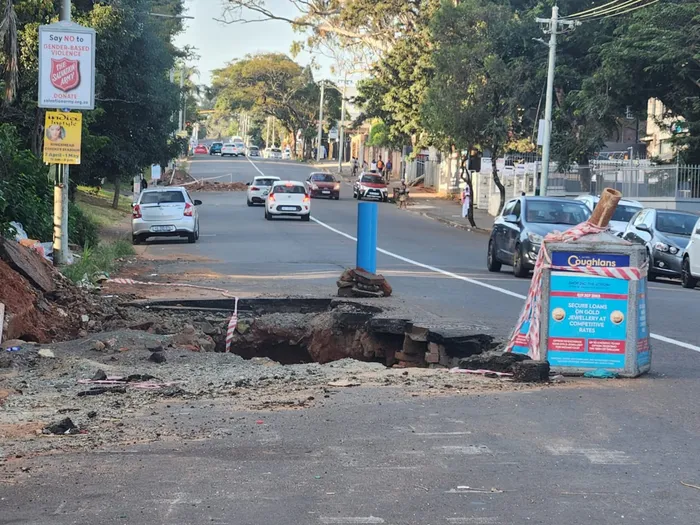How ageing infrastructure is impacting the local property market in South Africa

Municipalities are faced with the challenge of dealing with the legacies of the past regarding infrastructure development.
Image: Se-Anne Rall
The local property sector is facing challenges due to ageing public infrastructure, which suffers from limited maintenance and facilities management.
This comes as South Africa marks the end of the first year since the seventh Administration took office, following the National and Provincial Government Elections that took place on 29 May last year.
Additionally, there are ongoing delays in government payments to service providers, Nolubabalo Tsolo, the executive director at the Association of South African Quantity Surveyors (ASAQS), told "Independent Media Property".
She said a key issue is the lack of transparency regarding national government properties.
“The government continues to occupy leased buildings while simultaneously leasing out its properties. To address these issues, the government needs to focus on improving its asset management systems.
"This will ensure that public property assets meet both social and economic objectives, ultimately helping to identify the value they provide,” Tsolo said.
The organisation which represents the quantity surveying profession at government, industry and any other forum said that with the 7th Administration, one year into the current term of office, the Minister of Public Works and Infrastructure (DPWI,) Dean Macphearson, has reported that state-owned buildings have been hijacked nationwide.
ASAQS said the minister has committed to conducting a comprehensive audit of all government-owned properties.
“Additionally, the minister stated that these buildings will be rehabilitated and used for housing. This is a positive step toward addressing the housing challenge that we face in South Africa.”
Addressing the Budget Vote on Wednesday, Human Settlements Minister Thembi Simelane highlighted illegal property occupation as a significant impediment to South Africa’s development objectives.
She said that during the current financial year, they will develop a Policy Framework for the Prevention of Illegal Eviction from an Unlawful Occupation of Land Act (PIE) to give effect to the latter’s amendments.
“We will also embark on countrywide stakeholder consultations and engagement sessions with various sector partners in the human settlements value chain on the Prevention of Illegal Eviction from an Unlawful Occupation of Land Act (PIE) draft policy,” Simelane said.
The housing backlog stands at over 2.4 million households in need of adequate housing in South Africa as per the National Housing Register.
In the five years between 2024-2029, Simelane said working with all their strategic partners, they have undertaken to deliver 237 000 Breaking New Ground (BNG) units, 314 000 serviced stands, 140 000 subsidies disbursed through various housing interventions to the missing middle, upgrading 4 075 informal settlements, 15 000 social housing units, register and handover 80 000 title deeds and improve the management of available rental stock by achieving a 95% tenanting rate and a 90% collection rate in social rental stock.
ASAQS said that challenges that are continuing to affect the South African property sector are the procurement processes, citing that there should be transparency on the procurement policies, and the country needs to be aware of the companies that are constantly appointed.
It said the delay in the payment of service providers continues to be an obstacle to the progression of the economy of the country as this leads to companies closing and some employees’ salaries being delayed.
Tsolo said the DHS should aim to achieve a property management system that integrates with the asset management system and procurement system, thereby ensuring transparency to alleviate corruption.
In the Budget Vote speech, Simelane said that a few years ago, the Department developed the Housing Subsidy System (HSS), a portal that is supposed to serve as a housing needs register data bank and information system.
However, she said it is a legacy system which is not compatible with the latest technologies and lacks the critical component of citizen engagement.
“Working with the State Information Technology Agency (SITA), we are in the process of developing the National Digital Human Settlements Management System, which will modernise the way we manage human settlements data and improve coordination across departments.
"This initiative will address current inefficiencies by providing a centralised platform for better resource management and service delivery,” Simelane said.
She added that this system aims to improve efficiency, transparency, and accountability in the management of construction projects, ensuring the timely completion of projects and accurate allocation of resources.
“The integrated software solution aims to streamline and automate various processes related to managing human settlements. It will help government housing authorities, urban planners, and city administrators to efficiently manage housing, land, infrastructure development, housing beneficiary lists and related aspects of human settlements.
"The development of a comprehensive, integrated online National Digital Human Settlements Management System (NDHS MS) will further enable citizens to apply online for a housing product and be informed about the outcome of their applications,” said Simelane.
Related Topics: